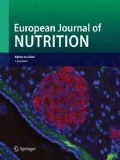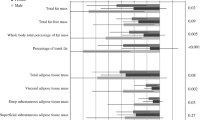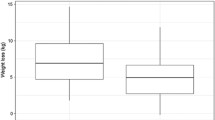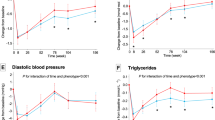Abstract
Purpose
Adiponectin gene variations have been associated with obesity. There are few interventional studies analyzing this association. The aim of this study was to analyze the effects of a nutritional intervention with Mediterranean-style diet and three (−4034A/C, +45T/G, and +276 G/T) adiponectin gene variants on 3-year body weight changes in high cardiovascular risk patients.
Subjects and methods
A total of 737 participants, aged 55–80 at high cardiovascular risk were assigned to a low-fat diet or to a Mediterranean-style diet (MD) groups, one with high intake of virgin olive oil (VOO) and the other with high intake of nuts. Anthropometric parameters were taken at baseline and after 3-year follow-up, and the genotyping of the −4034A/C, +45T/G, and +276 G/T polymorphisms was done.
Results
GG genotype of the +45T/G polymorphism was associated with 3-year higher body weight gain (B = 1.399; B = 0.043). TT genotype of the +276G/T polymorphism was linked to the highest 3-year body weight gain in men. Both Mediterranean diets appeared to reverse this effect (p for interaction = 0.053).
Conclusion
Adiponectin gene variation appeared to be associated with 3-year body weight changes in a high cardiovascular risk population. This association may be modulated by a nutritional intervention with a Mediterranean-style diet.
Similar content being viewed by others
References
Ronti T, Lupattelli G, Mannarino E (2006) The endocrine function of adipose tissue: an update. Clin Endocrinol (Oxf) 64:355–365
Maeda K, Okubo K, Shimomura I, Funahashi T, Matsuzawa Y, Matsubara K (1996) cDNA cloning and expression of a novel adipose specific collagen-like factor, apM1 (AdiPose most abundant gene transcript 1). Biochem Biophys Res Commun 221:286–289
Berg AH, Scherer PE (2005) Adipose tissue, inflammation, and cardiovascular disease. Circ Res 96:939–949
Arita Y, Kihara S, Ouchi N, Takahashi M, Maeda K, Miyagawa J, Hotta K, Shimomura I, Nakamura T, Miyaoka K, Kuriyama H, Nishida M, Yamashita S, Okubo K, Matsubara K, Muraguchi M, Ohmoto Y, Funahashi T, Matsuzawa Y (1999) Paradoxical decrease of an adipose-specific protein, adiponectin, in obesity. Biochem Biophys Res Commun 257:79–83
Bilgili S, Celebiler AC, Dogan A, Karaca B (2008) Inverse relationship between adiponectin and plasminogen activator inhibitor-1 in metabolic syndrome patients. Endocr Regul 42:63–68
Valle M, Martos R, Gascon F, Canete R, Zafra MA, Morales R (2005) Low-grade systemic inflammation, hypoadiponectinemia and a high concentration of leptin are present in very young obese children, and correlate with metabolic syndrome. Diabetes Metab 31:55–62
Dzielinska Z, Januszewicz A, Wiecek A, Demkow M, Makowiecka-Ciesla M, Prejbisz A, Kadziela J, Mielniczuk R, Florczak E, Janas J, Januszewicz M, Ruzyllo W (2003) Decreased plasma concentration of a novel anti-inflammatory protein—adiponectin—in hypertensive men with coronary artery disease. Thromb Res 110:365–369
Kumada M, Kihara S, Sumitsuji S, Kawamoto T, Matsumoto S, Ouchi N, Arita Y, Okamoto Y, Shimomura I, Hiraoka H, Nakamura T, Funahashi T, Matsuzawa Y (2003) Association of hypoadiponectinemia with coronary artery disease in men. Arterioscler Thromb Vasc Biol 23:85–89
Rothenbacher D, Brenner H, Marz W, Koenig W (2005) Adiponectin, risk of coronary heart disease and correlations with cardiovascular risk markers. Eur Heart J 26:1640–1646
Duncan BB, Schmidt MI, Pankow JS, Bang H, Couper D, Ballantyne CM, Hoogeveen RC, Heiss G (2004) Adiponectin and the development of type 2 diabetes: the atherosclerosis risk in communities study. Diabetes 53:2473–2478
Stumvoll M, Tschritter O, Fritsche A, Staiger H, Renn W, Weisser M, Machicao F, Haring H (2002) Association of the T-G polymorphism in adiponectin (exon 2) with obesity and insulin sensitivity: interaction with family history of type 2 diabetes. Diabetes 51:37–41
Menzaghi C, Ercolino T, Di Paola R, Berg AH, Warram JH, Scherer PE, Trischitta V, Doria A (2002) A haplotype at the adiponectin locus is associated with obesity and other features of the insulin resistance syndrome. Diabetes 51:2306–2312
Tanko LB, Siddiq A, Lecoeur C, Larsen PJ, Christiansen C, Walley A, Froguel P (2005) ACDC/adiponectin and PPAR-gamma gene polymorphisms: implications for features of obesity. Obes Res 13:2113–2121
Goyenechea E, Collins LJ, Parra D, Abete I, Crujeiras AB, O’Dell SD, Martinez JA (2009) The - 11391 G/A polymorphism of the adiponectin gene promoter is associated with metabolic syndrome traits and the outcome of an energy-restricted diet in obese subjects. Horm Metab Res 41:55–61
Keys A, Grande F (1957) Role of dietary fat in human nutrition. III. Diet and the epidemiology of coronary heart disease. Am J Public Health Nations Health 47:1520–1530
Schroder H, Marrugat J, Vila J, Covas MI, Elosua R (2004) Adherence to the traditional mediterranean diet is inversely associated with body mass index and obesity in a spanish population. J Nutr 134:3355–3361
Martinez-Gonzalez MA, Sanchez-Villegas A (2004) The emerging role of Mediterranean diets in cardiovascular epidemiology: monounsaturated fats, olive oil, red wine or the whole pattern? Eur J Epidemiol 19:9–13
Trichopoulou A (2004) Traditional Mediterranean diet and longevity in the elderly: a review. Public Health Nutr 7:943–947
Estruch R, Martinez-Gonzalez MA, Corella D, Salas-Salvado J, Ruiz-Gutierrez V, Covas MI, Fiol M, Gomez-Gracia E, Lopez-Sabater MC, Vinyoles E, Aros F, Conde M, Lahoz C, Lapetra J, Saez G, Ros E (2006) Effects of a Mediterranean-style diet on cardiovascular risk factors: a randomized trial. Ann Intern Med 145:1–11
Fernandez-Jarne E, Martinez-Losa E, Prado-Santamaria M, Brugarolas-Brufau C, Serrano-Martinez M, Martinez-Gonzalez MA (2002) Risk of first non-fatal myocardial infarction negatively associated with olive oil consumption: a case-control study in Spain. Int J Epidemiol 31:474–480
Martinez-Gonzalez MA, Fernandez-Jarne E, Serrano-Martinez M, Wright M, Gomez-Gracia E (2004) Development of a short dietary intake questionnaire for the quantitative estimation of adherence to a cardioprotective Mediterranean diet. Eur J Clin Nutr 58:1550–1552
Albert CM, Gaziano JM, Willett WC, Manson JE (2002) Nut consumption and decreased risk of sudden cardiac death in the Physicians’ Health Study. Arch Intern Med 162:1382–1387
Hu FB, Stampfer MJ, Manson JE, Rimm EB, Colditz GA, Rosner BA, Speizer FE, Hennekens CH, Willett WC (1998) Frequent nut consumption and risk of coronary heart disease in women: prospective cohort study. BMJ 317:1341–1345
Sabate J, Fraser GE (1994) Nuts: a new protective food against coronary heart disease. Curr Opin Lipidol 5:11–16
Buckland G, Bach A, Serra-Majem L (2008) Obesity and the Mediterranean diet: a systematic review of observational and intervention studies. Obes Rev 9:582–593
Fung TT, Rexrode KM, Mantzoros CS, Manson JE, Willett WC, Hu FB (2009) Mediterranean diet and incidence of and mortality from coronary heart disease and stroke in women. Circulation 119:1093–1100
Sofi F, Cesari F, Abbate R, Gensini GF, Casini A (2008) Adherence to Mediterranean diet and health status: meta-analysis. BMJ 337:a1344
de Lorgeril M, Salen P, Martin JL, Monjaud I, Delaye J, Mamelle N (1999) Mediterranean diet, traditional risk factors, and the rate of cardiovascular complications after myocardial infarction: final report of the Lyon Diet Heart Study. Circulation 99:779–785
Zazpe I, Sanchez-Tainta A, Estruch R, Lamuela-Raventos RM, Schroder H, Salas-Salvado J, Corella D, Fiol M, Gomez-Gracia E, Aros F, Ros E, Ruiz-Gutierrez V, Iglesias P, Conde-Herrera M, Martinez-Gonzalez MA (2008) A large randomized individual and group intervention conducted by registered dietitians increased adherence to Mediterranean-type diets: the PREDIMED study. J Am Diet Assoc 108:1134–1144 discussion 1145
Martin-Moreno JM, Boyle P, Gorgojo L, Maisonneuve P, Fernandez-Rodriguez JC, Salvini S, Willett WC (1993) Development and validation of a food frequency questionnaire in Spain. Int J Epidemiol 22:512–519
Razquin C, Martinez JA, Martinez-Gonzalez MA, Corella D, Santos JM, Marti A (2009) The Mediterranean diet protects against waist circumference enlargement in 12Ala carriers for the PPARgamma gene: 2 years’ follow-up of 774 subjects at high cardiovascular risk. Br J Nutr 102:672–679
Krauss RM, Eckel RH, Howard B, Appel LJ, Daniels SR, Deckelbaum RJ, Erdman JW Jr, Kris-Etherton P, Goldberg IJ, Kotchen TA, Lichtenstein AH, Mitch WE, Mullis R, Robinson K, Wylie-Rosett J, St Jeor S, Suttie J, Tribble DL, Bazzarre TL (2000) AHA dietary guidelines: revision 2000: a statement for healthcare professionals from the Nutrition Committee of the American Heart Association. Circulation 102:2284–2299
Corella D, Gonzalez JI, Bullo M, Carrasco P, Portoles O, Diez-Espino J, Covas MI, Ruiz-Gutierrez V, Gomez-Gracia E, Aros F, Fiol M, Herrera MC, Santos JM, Saez G, Lamuela R, Lahoz C, Vinyoles E, Ros E, Estruch R (2009) Polymorphisms cyclooxygenase-2 −765G>C and interleukin-6 −174G>C are associated with serum inflammation markers in a high cardiovascular risk population and do not modify the response to a Mediterranean diet supplemented with virgin olive oil or nuts. J Nutr 139:128–134
Fito M, Guxens M, Corella D, Saez G, Estruch R, de la Torre R, Frances F, Cabezas C, Lopez-Sabater Mdel C, Marrugat J, Garcia-Arellano A, Aros F, Ruiz-Gutierrez V, Ros E, Salas-Salvado J, Fiol M, Sola R, Covas MI (2007) Effect of a traditional Mediterranean diet on lipoprotein oxidation: a randomized controlled trial. Arch Intern Med 167:1195–1203
Bes-Rastrollo M, Sanchez-Villegas A, de la Fuente C, de Irala J, Martinez JA, Martinez-Gonzalez MA (2006) Olive oil consumption and weight change: the SUN prospective cohort study. Lipids 41:249–256
Menzaghi C, Ercolino T, Salvemini L, Coco A, Kim SH, Fini G, Doria A, Trischitta V (2004) Multigenic control of serum adiponectin levels: evidence for a role of the APM1 gene and a locus on 14q13. Physiol Genomics 19:170–174
Hu FB, Doria A, Li T, Meigs JB, Liu S, Memisoglu A, Hunter D, Manson JE (2004) Genetic variation at the adiponectin locus and risk of type 2 diabetes in women. Diabetes 53:209–213
Hara K, Boutin P, Mori Y, Tobe K, Dina C, Yasuda K, Yamauchi T, Otabe S, Okada T, Eto K, Kadowaki H, Hagura R, Akanuma Y, Yazaki Y, Nagai R, Taniyama M, Matsubara K, Yoda M, Nakano Y, Tomita M, Kimura S, Ito C, Froguel P, Kadowaki T (2002) Genetic variation in the gene encoding adiponectin is associated with an increased risk of type 2 diabetes in the Japanese population. Diabetes 51:536–540
Fredriksson J, Carlsson E, Orho-Melander M, Groop L, Ridderstrale M (2006) A polymorphism in the adiponectin gene influences adiponectin expression levels in visceral fat in obese subjects. Int J Obes (Lond) 30:226–232
Bouatia-Naji N, Meyre D, Lobbens S, Seron K, Fumeron F, Balkau B, Heude B, Jouret B, Scherer PE, Dina C, Weill J, Froguel P (2006) ACDC/adiponectin polymorphisms are associated with severe childhood and adult obesity. Diabetes 55:545–550
Ntalla I, Dedoussis G, Yannakoulia M, Smart MC, Louizou E, Sakka SD, Papoutsakis C, Talmud PJ (2009) ADIPOQ gene polymorphism rs1501299 interacts with fibre intake to affect adiponectin concentration in children: the GENe-Diet Attica Investigation on childhood obesity. Eur J Nutr 48:493–497
Mendez MA, Popkin BM, Jakszyn P, Berenguer A, Tormo MJ, Sanchez MJ, Quiros JR, Pera G, Navarro C, Martinez C, Larranaga N, Dorronsoro M, Chirlaque MD, Barricarte A, Ardanaz E, Amiano P, Agudo A, Gonzalez CA (2006) Adherence to a Mediterranean diet is associated with reduced 3-year incidence of obesity. J Nutr 136:2934–2938
Salas-Salvado J, Fernandez-Ballart J, Ros E, Martinez-Gonzalez MA, Fito M, Estruch R, Corella D, Fiol M, Gomez-Gracia E, Aros F, Flores G, Lapetra J, Lamuela-Raventos R, Ruiz-Gutierrez V, Bullo M, Basora J, Covas MI (2008) Effect of a Mediterranean diet supplemented with nuts on metabolic syndrome status: one-year results of the PREDIMED randomized trial. Arch Intern Med 168:2449–2458
Mantzoros CS, Williams CJ, Manson JE, Meigs JB, Hu FB (2006) Adherence to the Mediterranean dietary pattern is positively associated with plasma adiponectin concentrations in diabetic women. Am J Clin Nutr 84:328–335
Yannakoulia M, Yiannakouris N, Melistas L, Kontogianni MD, Malagaris I, Mantzoros CS (2008) A dietary pattern characterized by high consumption of whole-grain cereals and low-fat dairy products and low consumption of refined cereals is positively associated with plasma adiponectin levels in healthy women. Metabolism 57:824–830
Razquin C, Martinez JA, Martinez-Gonzalez MA, Bes-Rastrollo M, Fernandez-Crehuet J, Marti A (2009) A 3-year intervention with a Mediterranean diet modified the association between the rs9939609 gene variant in FTO and body weight changes. Int J Obes (Lond) (in press)
Andreasen CH, Stender-Petersen KL, Mogensen MS, Torekov SS, Wegner L, Andersen G, Nielsen AL, Albrechtsen A, Borch-Johnsen K, Rasmussen SS, Clausen JO, Sandbaek A, Lauritzen T, Hansen L, Jorgensen T, Pedersen O, Hansen T (2008) Low physical activity accentuates the effect of the FTO rs9939609 polymorphism on body fat accumulation. Diabetes 57:95–101
Astrup A, Ryan L, Grunwald GK, Storgaard M, Saris W, Melanson E, Hill JO (2000) The role of dietary fat in body fatness: evidence from a preliminary meta-analysis of ad libitum low-fat dietary intervention studies. Br J Nutr 83(Suppl 1):S25–S32
Goyenechea E, Parra D, Crujeiras AB, Abete I, Martinez JA (2009) A nutrigenomic inflammation-related PBMC-based approach to predict the weight-loss regain in obese subjects. Ann Nutr Metab 54:43–51
Acknowledgments
We are specially indebted to Prof. Valentina Ruiz-Gutierrez from Instituto de la Grasa, CSIC, Sevilla (Spain) for her invaluable help in ensuring free provision of olive oil to our participants and to all other members of the PREDIMED group: Salas-Salvado J, Corella D, Fiol M, Ros E, Aros F, Gomez-Gracia E, Lamuela-Raventos RM, Saez G, Lapetra J, Serra-Majem L, Pinto L, Covas MI, Tur JA, and Portillo MP. We would like to thank all the sources of support: Department of Health of the Navarra Government (Spain), Linea Especial (LE 97) of the University of Navarra, the RETICS Scheme funded by the Spanish Ministry of Health (PREDIMED Project, reference RD 06/0045/0000) and CIBERobn which is an initiative of ISCIII (CB06/03/1017). C. Razquin is a predoctoral fellow funded by IBERCAJA. We would also like to thank all the participants and members of the PREDIMED project.
Author information
Authors and Affiliations
Corresponding author
Rights and permissions
About this article
Cite this article
Razquin, C., Martínez, J.A., Martínez-González, M.A. et al. A 3-year Mediterranean-style dietary intervention may modulate the association between adiponectin gene variants and body weight change. Eur J Nutr 49, 311–319 (2010). https://doi.org/10.1007/s00394-009-0090-2
Received:
Accepted:
Published:
Issue Date:
DOI: https://doi.org/10.1007/s00394-009-0090-2




